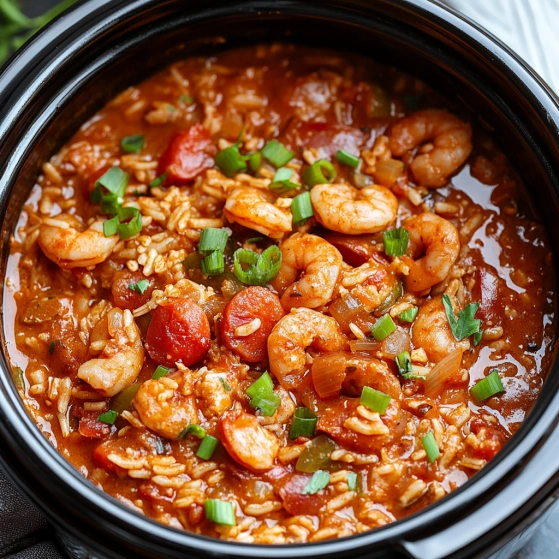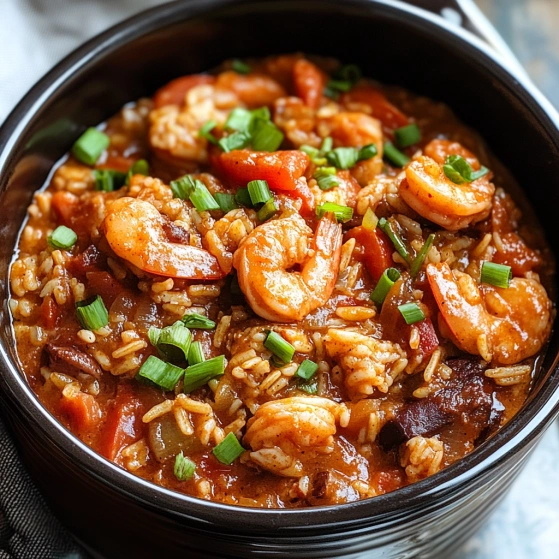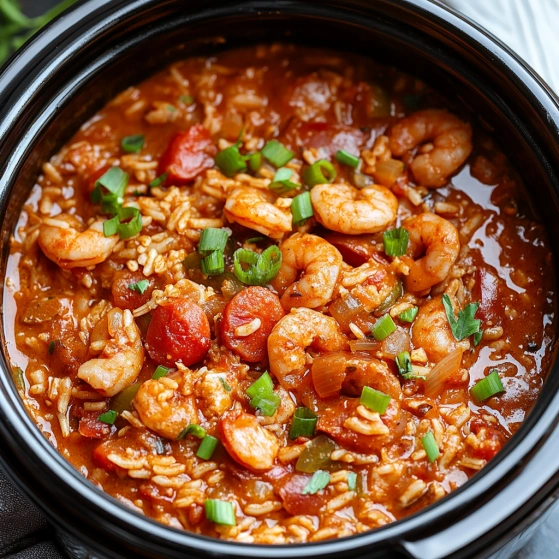 Pin it
Pin it
Slow cooker jambalaya transforms a traditionally labor-intensive Cajun classic into an effortless weeknight wonder. This one-pot meal combines smoky sausage, succulent shrimp, and aromatic vegetables with rice and bold seasonings to create a deeply satisfying dish that practically makes itself. The slow cooking process allows all the flavors to meld together perfectly, developing that authentic Louisiana taste without requiring constant attention at the stove.
I've made this slow cooker jambalaya countless times when hosting friends for game days. The rich aroma filling the house always draws everyone to the kitchen, and I love how I can prepare it ahead and actually enjoy time with my guests instead of being stuck cooking.
Ingredients
- Smoked sausage (1 lb, sliced): Provides the smoky foundation that gives jambalaya its distinctive flavor; andouille is traditional, but any smoked sausage works well.
- Shrimp (1 lb, peeled and deveined): Adds a delicate seafood sweetness; look for medium-sized shrimp that aren't too small to get lost in the dish.
- Bell pepper (1, chopped): Contributes essential flavor to the "holy trinity" of Cajun cooking; red peppers offer a slightly sweeter taste than green.
- Onion (1, chopped): Another crucial element of the trinity that provides aromatic sweetness; yellow onions work best for their balanced flavor.
- Garlic (3 cloves, minced): Infuses the entire dish with its aromatic qualities; fresh is vastly superior to pre-minced.
- Diced tomatoes (14 oz can, undrained): The tomato juice adds moisture while the tomatoes provide acidity to balance the rich ingredients.
- Chicken broth (2 cups): Creates the flavorful liquid base for cooking the rice; use low-sodium to control salt levels.
- Long-grain rice (1 cup): Absorbs all the delicious flavors while maintaining its structure; jasmine or basmati work well too.
- Cajun seasoning (2 tsp): The signature spice blend that brings authentic flavor; check spice level as brands vary significantly.
- Salt and pepper (to taste): For final seasoning adjustments.
- Green onions (for garnish): Adds color, freshness, and a mild onion bite to the finished dish.
Step-by-Step Cooking Instructions
- Step 1:
- Slice the smoked sausage into ¼-inch rounds. Ensure shrimp are properly peeled and deveined (leave tails on for presentation if desired). Dice the bell pepper and onion into approximately ½-inch pieces for even cooking. Mince the garlic finely to distribute its flavor throughout the dish. Having everything prepped before assembly makes the process seamless.
- Step 2:
- Begin by placing the sliced sausage at the bottom of your slow cooker as it releases flavorful oils during cooking. Add the chopped vegetables (bell pepper, onion, and garlic) next, followed by the diced tomatoes with their juice. The layering helps ensure even distribution of ingredients and proper flavor development.
- Step 3:
- Sprinkle the rice evenly over the vegetable layer, then pour in the chicken broth. The liquid should just cover the ingredients - add a bit more broth if needed. Sprinkle the Cajun seasoning, salt, and pepper evenly across the surface. Avoid stirring at this point to keep the rice submerged in liquid for proper cooking.
- Step 4:
- Cover the slow cooker and set to low for 4-5 hours or high for 2-3 hours. The exact time will depend on your specific slow cooker, so check at the minimum time. The rice should be tender but not mushy, and most of the liquid should be absorbed. If the rice isn't quite done but liquid is scarce, add a small amount of hot broth.
- Step 5:
- About 30 minutes before serving, gently stir in the shrimp, pushing them slightly into the mixture. Shrimp cook quickly and will become tough if overcooked, so this late addition ensures they remain tender and juicy. Replace the lid and continue cooking until shrimp turn pink and opaque.
- Step 6:
- Once everything is cooked, let the jambalaya rest for 10 minutes with the lid off. This allows the excess moisture to evaporate slightly and helps the dish set up to the perfect consistency. Taste and adjust seasonings if needed, then sprinkle liberally with sliced green onions before serving.
 Pin it
Pin it
My husband grew up in southern Louisiana, and while he was initially skeptical about slow cooker jambalaya, he now requests it regularly. The bell peppers are my personal favorite component – they absorb all the smoky-spicy flavors while maintaining just enough texture to add interest to each bite. My children were hesitant about the spice level at first, but now they clean their plates every time.
The Art of Spice Balancing
Finding the perfect spice level for jambalaya can make or break this classic dish. Commercial Cajun seasoning blends vary dramatically in heat level and salt content, so it's worth sampling yours before adding the full amount. I prefer starting with about half the recommended seasoning, then tasting and adjusting upward. Remember that slow cooking intensifies spices, so what might seem mild at the beginning can develop significant heat by serving time. For families with mixed spice preferences, serving hot sauce on the side allows each person to customize their bowl. The beauty of jambalaya is its ability to showcase spices without overwhelming the delicate flavors of the shrimp and vegetables.
Protein Variations Worth Trying
While this recipe calls for the classic combination of sausage and shrimp, jambalaya welcomes creative protein substitutions based on what you have available. Boneless chicken thighs cut into chunks work beautifully and should be added at the beginning with the sausage. For a more budget-friendly version, you can omit the shrimp entirely and double the sausage or add chicken. Some of my coastal friends make an incredible seafood variation by adding firm white fish chunks and even small scallops along with the shrimp in the final cooking stage. I've also made a delicious meatless version using extra-firm tofu and vegetable broth, increasing the Cajun seasoning slightly to compensate for the milder proteins.
 Pin it
Pin it
Make-Ahead and Storage Strategy
Jambalaya's flavors actually improve with time, making it an excellent make-ahead dish for busy weeks. You can prepare everything through step four (cooking without the shrimp), then cool and refrigerate for up to two days. When ready to serve, reheat in the slow cooker on low for about an hour, then add the shrimp and complete the recipe. Leftovers store beautifully for 3-4 days in the refrigerator in airtight containers. When reheating, add a small splash of broth to restore moisture, especially if the rice has absorbed most of the liquid. For longer storage, portion cooled jambalaya into freezer containers, leaving out the shrimp (add freshly cooked shrimp when reheating for best texture). Frozen jambalaya maintains quality for about two months and makes an excellent emergency dinner option on hectic evenings.
Frequently Asked Questions
- → Can I use other proteins besides shrimp and sausage?
Yes, you can substitute chicken, crawfish, or turkey sausage to suit your preferences or dietary restrictions.
- → What type of rice works best for this dish?
Long-grain rice is ideal as it holds its texture well during slow cooking. Avoid instant or quick-cooking rice.
- → How can I adjust the spice level?
You can increase or decrease the Cajun seasoning based on your preference, and add hot sauce for extra heat.
- → Can I make this dish ahead of time?
Yes, you can prepare this jambalaya ahead of time, store it in an airtight container, and reheat before serving.
- → What sides pair well with jambalaya?
Serve jambalaya with a fresh green salad, cornbread, or steamed vegetables for a well-rounded meal.
